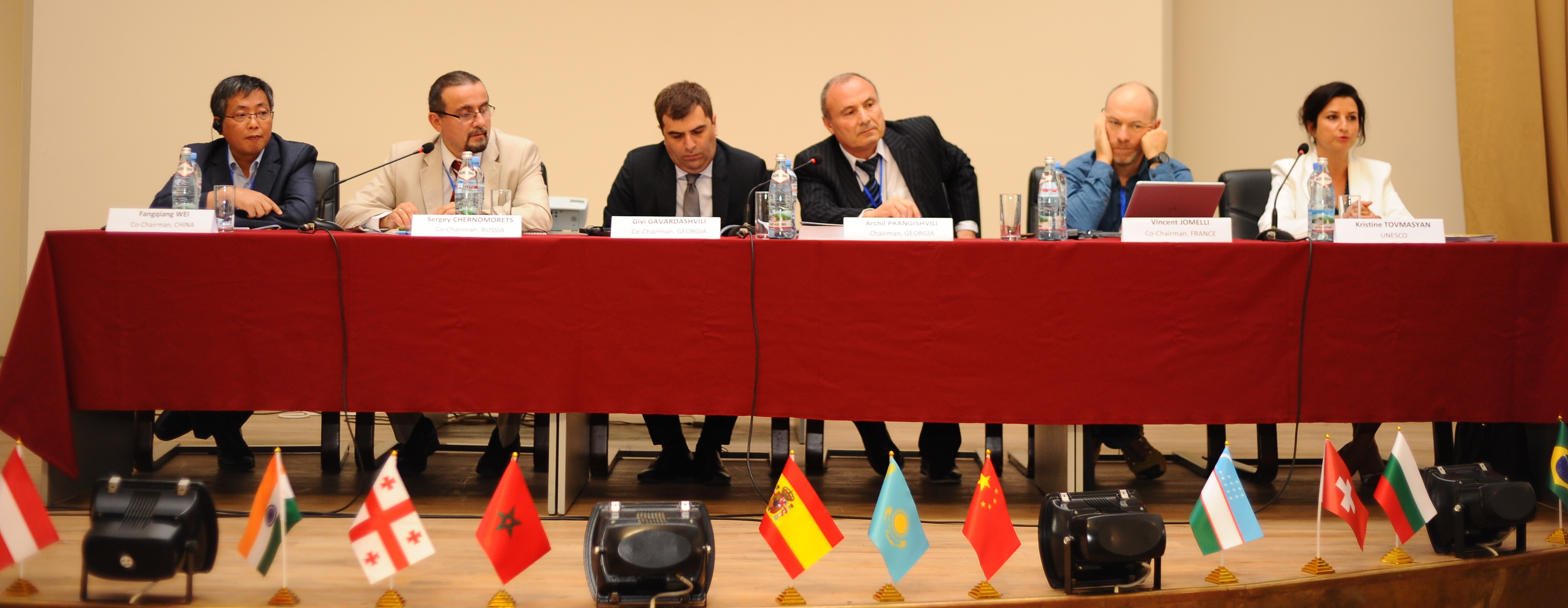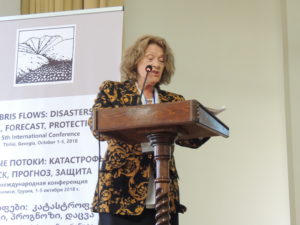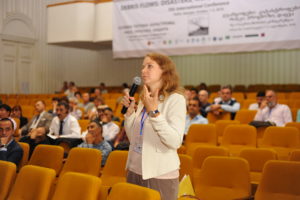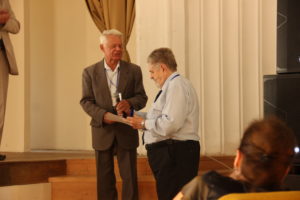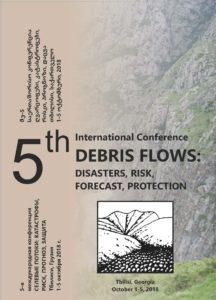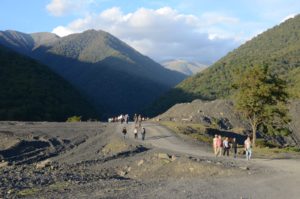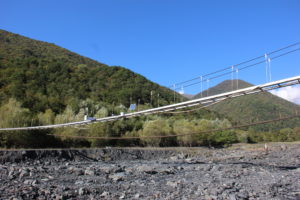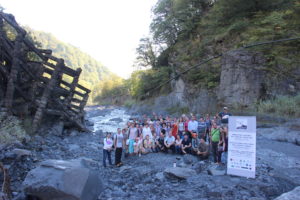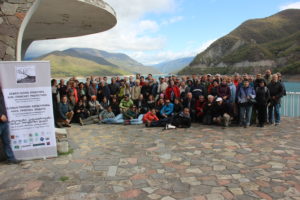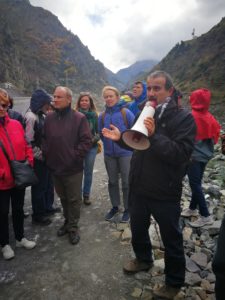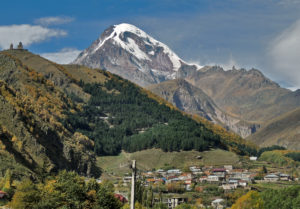5th conference on “Debris Flows: Disasters, Risk, Forecast, Protection”
Conferees in front of the building of the Georgian Technical University. Tbilisi, October 1, 2018. Photo by Giorgi Daraselia.
The 5th International Conference on Debris Flows: Disasters, Risks, Forecast, Protection took place on October 1-5, 2018 in Tbilisi (Georgia).
Debris flows in mountain regions cause significant damage to economy and quite often lead to victims among the population. The solution of debris flows problem requires cooperation of experts from various countries. Among the forms of such cooperation are the conferences on Debris Flows: Disasters, Risks, Forecast, Protection. The fifth such conference held in Georgia continues a series of the conferences under the same name held in Pyatigorsk (2008), Moscow (2012), Yuzhno-Sakhalinsk (2014), Irkutsk and Arshan (2016).
Studying of debris flows in Georgia began in the middle of the 19th century. Maps of debris flow risk and regionalization were compiled, stationary investigations within test catchment areas were conducted, experimental debris flow modeling in a special tray was undertaken, and debris flow control constructions were developed and installed. The Georgian school of debris flow investigation presented by such prominent experts as E.S. Avaliani, D.P. Berdzenishvili, G.M. Beruchashvili, G.V. Gavardashvili, M.S. Gagoshidze, Z.S. Iordanishvili, E.G. Kukhalashvili, M.A. Makarashvili, O.G. Natishvili, N.V. Rukhadze, L.D. Sokhadze, L.A. Sulakvelidze, V.I. Tevzadze, I.I. and G.I. Kherkheulidze, D.D. and E.D. Tsereteli is widely known. Therefore, the choice of Georgia as a venue of the conference was not by chance.
The Debris Flow Association (www.debrisflow.ru) was founded in 2005 in Pyatigorsk. It follows the traditions established in the 19th century by the Commissions on studying the Kazbek blockage and then the Debris Flow Commission of the USSR Academy of Sciences which was active from 1948 to the 1980-s. At present the Debris Flow Association pools more than 160 experts in debris flows investigation and protection against them from 23 countries.
The conference in Georgia was organized by the Debris Flow Association together with the Tsotne Mirtskhulava Water Management Institute of the Georgian Technical University in cooperation with the government services of Georgia (Ministry of Education, Science, Culture and Sport and Ministry of Environment Protection and Agriculture), UNESCO, Lomonosov Moscow State University, Faculty of Geography, Aga Khan Agency for Habitat, High Mountain Geophysical Institute, Chongqing Institute of Green and Intelligent Technologies and Institute of Mountain Hazards and Environment, Chinese Academy of Sciences, Laboratory of Physical Geography, National Center for the Scientific Research, France, Engineering Academy of Georgia, Ecocenter for Environmental Protection. The conference was sponsored by IBTP Koschuch e.U., Geo-Barrier, Caucasus Road Project, and Geobrugg AG, that participated in the conference exhibition. The chief information partner of the conference was Geomarketing Publishing Center.
The Georgian Technical University (GTU) was the venue of the conference activities. Welcome speeches were made by GTU rector A. Prangishvili, Acting Head of the Service on Emergency Management of Georgia Sh. Khutsishvili, director of the RAS Institute of Geography O. Solomina, director of the Mountain Geophysical Institute M. Bekkiev, representative of UNESCO K. Tovmasyan, Deputy Director of the Chongqing Institute of Green and Intellectual Technologies F. Wei, programs leader of the Laboratory of Physical Geography, National Center for the Scientific Research and University Panthéon-Sorbonne of Paris-1 V. Jomelli, President of Debris Flow Association S. Chernomorets.
The Minister of Education, Sciences, Culture and Sport of Georgia M. Batiashvili visited the conference which was covered by the Georgian media and television.
Conference opening ceremony. Photo by Giorgi Daraselia.
The conference aimed to discuss such questions as the global and regional analysis of debris flows, recent debris flow disasters, risk and forecast of debris flows, modelling, debris flow hazard of glacial lakes, ice-rock-water flows, debris flow control actions, normative documents on debris flow forecasting and design of debris-flow mitigation facilities and constructions, scientific schools and traditions of debris-flow science.
The conference was attended by nearly 200 experts from Austria, Azerbaijan, Armenia, Bulgaria, Brazil, Great Britain, Germany, Georgia, India, Spain, Italy, Kazakhstan, China, Morocco, Russia, Tajikistan, Uzbekistan, Ukraine, France and Switzerland. Conference website is: http://www.debrisflow.ru/df18/?lang=en.
In total 96 presentations, including 75 oral and 21 posters were presented at the conference. On October 1 the Plenary session (conveners G. Gavardashvili, S. Chernomorets) was held, as well as thematic sessions on “Debris flow risk reduction: from science to practice and international collaboration” (session organized by UNESCO, conveners K. Tovmasyan, G. Gaprindashvili), Debris flows and climate (conveners V. Jomelli, R. Yafyazovа), Debris flow disasters (conveners F. Wei, E. Garankina). On October 2 there were sessions on “Debris flow mitigation and monitoring” (convener A. Strom), “Debris flow hazard assessment” (conveners A. Shnyparkov, A. Kadetova), “Modelling of debris flows and floods” (conveners P. Bartelt, V. Kidyaeva), “Debris flow formation in different conditions” (conveners E. Talanov, E. Kozireva), “Regional analysis of debris flows” (conveners S. Sokratov, G. Pryakhina), as well as the seminar Where will disaster happen next? Modelling future lakes for risk management and decision making (conveners M. Shahgedanova and V. Kapitsa). The poster session was also held to present posters of the conference participants. On October 3 three sessions under the same name Methods and results of debris flow investigations (conveners S. Ranova, N. Kazakov, T. Vinogradova, R. Kalov) were held, followed by Discussion and the Closing ceremony.
Presentations were submitted by both experienced and young researchers. The geography of the studied regions covered mountain territories of Western and Central Europe, the Caucasus, Siberia, the Far East, Central Asia, Qinghai-Tibet Plateau, the Himalayas, North Africa, South America, the Arctic and Antarctica.
The combination of science and practice in debris flow studies is emphasized with the list of 59 organizations in which the conferees work:
– governmental ministries and agencies of Georgia (Ministry of Education, Science, Culture and Sport; Ministry of Regional Development and Infrastructure; National Environmental Agency of the Ministry of Environment Protection and Agriculture; Emergency Management Agency);
– international organizations (UNESCO; Aga Khan Agency for Habitat);
– universities (Al-Farabi Kazakh National University; Georgian Technical University; Irkutsk State Technical University; Kuban State University; Lomonosov Moscow State University; Moulay Ismaïl University, Morocco; University of Reading; University of Friburg; Saint-Petersburg State University; Salzburg University; Shushi Technological University; Sofia University “St. Kliment Ohridski”; University of Georgia; University of Natural Resources and Life Sciences, Vienna; University of Padova; Yerevan State University);
– academic institutes and centers (Center of Glaciological Studies, Academy of Sciences of the Republic of Tajikistan; Chongqing Institute of Green and Intelligent Technology, Chinese Academy of Sciences; Far East Geological Institute of Far Eastern Branch Russian Academy of Science, Sakhalin Department; Georgia National Academy of Sciences; Institute of Earth Crust, Siberian Branch of Russian Academy of Sciences; Institute of Geography, Kazakhstan; Institute of Geography RAS; Institute of Geology and Mineralogy, Siberian Branch of Russian Academy of Science; Institute of Mountain Hazards and Environment, Chinese Academy of Sciences; Institute of Water Problems, Hydropower and Ecology of the Academy of Sciences of the Republic of Tajikistan; Komarov Botanical Institute of Russian Academy of Sciences; Laboratory of Physical Geography, National Center for the Scientific Research, France; National Meteorological Centre, China; Ulugh Beg Astronomical Institute, Uzbekistan Academy of Sciences; Vakhushti Bagrationi Institute of Geography of the Tbilisi State University);
– research and design institutes (High-Mountain Geophysical Institute; Hydroproject Institute; Institute of Exploration Technology and Technical Center for Geological Hazard Prevention and Control, CGS, China; Institute of Geotechnics and Engineering Surveys in Construction; Institute of Hydrometeorology of the Georgian Technical University; Polar Marine Geosurvey Expedition; Swiss Federal Institute for Forest, Snow and Landscape Research; Tsotne Mirtskhulava Water Management Institute of the Georgian Technical University);
– public organizations and committees (Debris Flow Association; Brazilian Committee on Large Dams);
– consulting and design organizations (Baugeologisches Buero Bauer GmbH; Caucasus Road Project Ltd; Geo-Barrier; Geobrugg AG; GEOIZOL Project; Gidrotehproekt; IBTP Koschuch e.U.; Kazhydro; Trumer Schutzbauten GmbH);
– mass media (Geomarketing, representatives of TV channels).
At the closing ceremony of the conference, the highest awards of Debris Flow Association – Fleishman medals were handed out. O. Natishvili (Georgia), R. Genevois (Italy), E. Talanov (Kazakhstan) and D. Znamensky (Brazil) were awarded for their achievements in the field of debris flows investigation and promotion of international cooperation.
The Georgian Technical University organized a concert for conference participants at which the dancing staff and choir of the university performed.
Presentations and discussion. Photo by Giorgi Daraselia.
Awarding Fleishman medals. Photos by Elena Savernyuk and Sergey Chernomorets.
Proceedings of the conference are published as a collection of papers which includes 77 articles and in two issues of the Georisk journal (Russia). Publications of the conferees show the state-of-the-art in theory and methods used in debris flow investigation. It is hoped that the articles will be useful to decision-makers in the sphere of debris flow protection, researchers and practical experts. The published materials could be also used by university teachers and students when studying the debris flow phenomena.
Proceedings of the conference
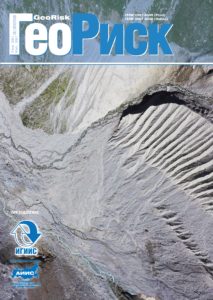
The Georisk journal (No. 3, 2018) with articles of the conference participants
An important element of the international undertaking was the post-conference field seminar which included two visits to debris flow basins of Georgia. The first trip included the inspection of eastern regions of Georgia – the historic frea of Kakheti. In the debris flow basin of Duruji, several decades long stationary investigations of debris flows were carried out accompanied by the experiments for creation of devices on studying debris flows and antidebris-flow constructions.
In the valley of the debris-flow dangerous Duruji River (Kakheti). Photo by Irina Kargapolova.
The debris flow warning system at the Duruji River. Photo by Sergey Chernomorets.
Conferees near the destroyed dam at the Duruji River upstream the Kvareli town. Photo by Irina Kargapolova.
The second trip was aimed at studying the area of the Georgian Military Road – one of the most ancient trade ways of mankind connecting the territories to the north and to the south of the Greater Caucasus Range. Investigation of debris flows in the Caucasus began within that territory in the middle of the 19th century. On the slopes of Mount Kazbek the well-known catastrophic Kazbek blockages arose, the latest of which took place in 2014. Participants visited the dam of Zhinvali hydroelectric power station in the Aragvi River valley, examined the upper courses of Belaya Aragvi and Terek river valleys, and visited the place of Kazbek blockages.
Conferees on the dam of Zhinvali hydroelectric power station on the Aragvi River. Photo by Irina Kargapolova.
At the place of Kazbek ice and stone blockages in the Terek River valley. Photo by Kaiheng Hu.
Mount Kazbek and the Gergeti settlement. Photo by Mikhail Dokukin.
According to the decision of the Presidium of Debris Flow Association and Organizing committee, the next 6th conference “Debris flows: disasters, risk, forecast, protection” will take place in the fall of 2020 in Tajikistan.

